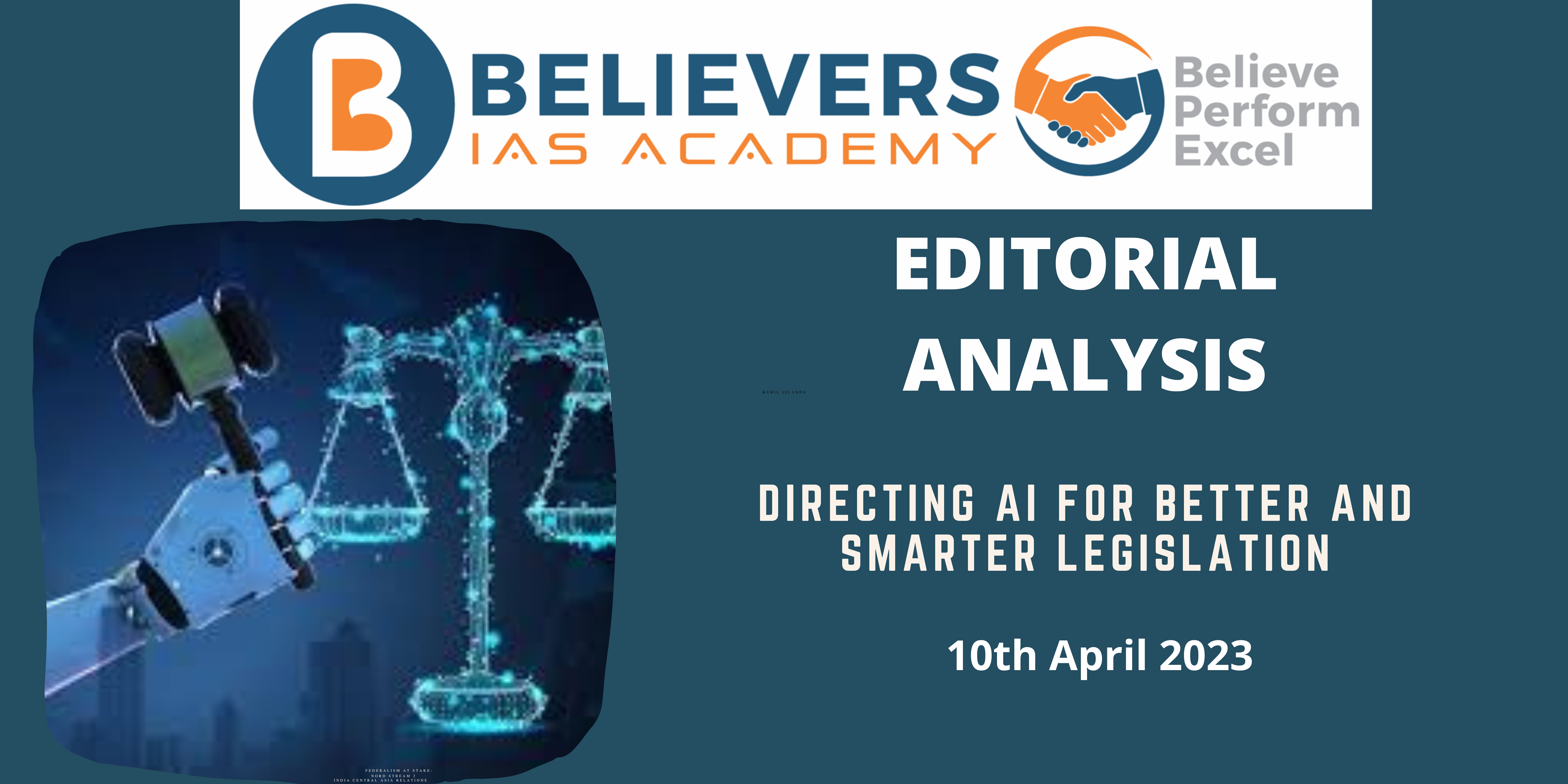Directing AI For Better And Smarter Legislation
Context:
Artificial intelligence (AI) is capturing the interest of business owners, political leaders, and legislators all around the world. The majority of developed democracies are now utilizing AI tools to improve legislation and parliamentary procedures.
Points to Ponder:
- Artificial intelligence (AI) is intelligence displayed by machines, as opposed to human and other animal intelligence. Speech recognition, computer vision, translation across (natural) languages, and other input mappings are examples of tasks where this is done.
- Advanced web search engines (e.g., Google Search), recommendation systems (used by YouTube, Amazon, and Netflix), understanding human speech (e.g., Siri and Alexa), self-driving cars (e.g., Waymo), generative or creative tools (ChatGPT and AI art), automated decision-making, and competing at the highest level in strategic game systems are examples of AI applications. (such as chess and Go).
- Artificial intelligence (AI) is capturing the interest of business owners, political leaders, and legislators all around the world. The majority of developed democracies are now utilizing AI tools to improve legislation and parliamentary procedures.
- AI tools can help MPs prepare responses for lawmakers, improve research quality, gather information about any Bill, prepare papers, and provide information on specific House rules, legislative drafting, amendments, interventions, and so on.
Obstacles Faced in India
- Opaque and complex laws: Current laws in India are opaque and complex, making it difficult for citizens and even legal specialists to understand them. This intricacy stems from various revisions made to the original statute throughout time, making it difficult to read and apply them correctly. The lack of clarity in legislation also leads to variations in their interpretation and application, producing uncertainty among residents and enterprises.
- The translation gap between law-making, law enforcement, and law-interpreting organizations: India has 22 official languages. Because of this variability, it is difficult to effectively translate legislation from one language to another. As a result, there is frequently a translation gap between the organizations that make laws, implement laws, and interpret laws. This chasm might lead to law misinterpretation and inappropriate application.
- Lack of a comprehensive chain of laws and regulations: The Indian government’s India Code webpage gives access to Acts and subordinate legislation passed by the national government. It does not, however, give an entire chain of laws and regulations, from the Parent Act to subordinate legislation and amendment notices. Because there is no entire chain of laws and regulations, citizens and companies find it difficult to understand the full ramifications of a specific legislation or rule.
- AI’s use in law, policy-making, and parliamentary activities is limited: Although AI is a formidable tool, its use in law, policy-making, and parliamentary activities in India are limited. There is a need to investigate the possibilities of AI in various domains and utilize its skills to improve the efficiency and effectiveness of governance.
- Need for open, transparent, and citizen-friendly AI use: It is critical to guarantee that AI is used in law, policymaking, and legislative activities in an open, transparent, and citizen-friendly manner. Artificial intelligence should be used to empower citizens and businesses rather than to create a schism between the government and its citizens. It should be utilized to improve governance rather than to completely replace human decision-making.
AI can assist legislators:
- Analyzing citizens’ grievances and social media responses: AI can analyze large volumes of data from citizens’ grievances and social media platforms to identify common issues and priorities that need immediate attention. This can help legislators to understand their constituents’ concerns and take proactive steps to address them.
- Seeking citizen input for public consultation of laws: Artificial intelligence can aid in the process of seeking citizen input and feedback on proposed laws using online platforms and surveys. This can assist in guaranteeing that public opinion is taken into account when writing legislation and that the perspectives of many stakeholders are represented.
- The process of automating the analysis of discrepancies between bills, amendments, and current laws: AI can assist legislative personnel in comparing and contrasting different versions of bills and amendments, as well as determining their possible influence on current legislation. This can help to streamline the legislative process and increase legislation quality.
- Simulating the potential consequences of laws: AI can assist in the modeling of diverse datasets, such as census data, household consumption, and public infrastructure, to simulate the potential implications of various policy options. This can assist legislators in assessing the potential impact of proposed legislation and making more informed judgments.
- Overall, AI can assist legislators in making better decisions by providing them with timely and reliable information, identifying critical concerns and priorities, and simulating the probable repercussions of various policy options.




